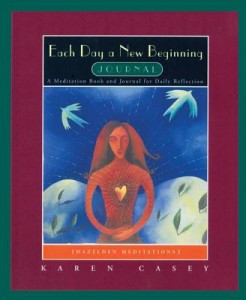 Daily Meditations for Women, by Karen Casey (Hazelden, 1982)
Daily Meditations for Women, by Karen Casey (Hazelden, 1982)
Soon, I’m going to have to purchase a new copy of this book. The copy I have now is falling apart, taped together, dog-eared. The inscription on the flyleaf from the giver reminds me that it was a birthday gift in 1985. I have read it every day since. That means I’ve read each meditation somewhere between 27 and 28 times.
They don’t get stale. They become “old friends.” And the number of times I turn to the day’s entry and it’s startlingly apropos for what’s happening in my life that day— well, I’ve lost count.
I do remember thinking, before I received this book, that the whole “daily meditations” thing was kind of hokey. Artificial. Great way for Hazelden to make a little more money. Helpful for some folks, maybe… the ones who for whatever reason needed more than Big Blue and the 12/12. Of course, I didn’t have much experience with recovery then, either. So for the first year, I was reading it mainly out of a sense of obligation to the giver. So that if/when she asked about it I could say yes, I was reading it.
By the next year, it had become a habit. One I didn’t mind continuing because I had noticed that, now and then, the meditation I read was surprisingly useful. It provided just the right reminder, pointed just the right direction. Made me ask the right question of myself, and even think about the answer.
We talk elsewhere on this website about the value of using cognitive tools to help re-direct and re-shape our thinking patterns in healthy directions. Tools for doing this range from the simple (affirmations like “One Day at a Time”) to the more complex (custom-developed cognitive behavioral or NLP scripts.) Daily meditations fall somewhere in between. There are dozens of in-print daily meditation books available, with varying audiences and areas of focus. Some are pretty specific: Taoists, co-dependency, non-Theists, overcoming depression. Others have only general applicability to healthy living, rather than a specific orientation for living recovery. Some, like “Twenty-Four Hours a Day” or “One Day at a Time in Al-Anon” are very specific to 12-Step practice.
“Each Day a New Beginning” is written for women in recovery, without a specific 12-Step focus, though references to the program are clear for the 12-step oriented. It addresses a wide range of topics (there’s a topic index.) A sampling: “Turning Over,” “Obstacles,” “Progress,” “Children,” “Forgiveness,” “Spontaneity.” Each entry is headed with a short quote, and footed with an affirmation that summarizes the meditation.
For me the value of the book is twofold: The meditations themselves, refocusing my mind on paying attention to how I live and respond to day-to-day challenges and joys, and the discipline of taking a few minutes, each day, to renew my commitment to trying again, today, no matter how well or poorly I might have realized yesterday’s plans and hopes.
It’s still one of the best birthday gifts I ever received.
(A companion book, “Touchstones,” provides similar meditations focused for men in recovery.)

 — January 25, 2013 @
— January 25, 2013 @ 







